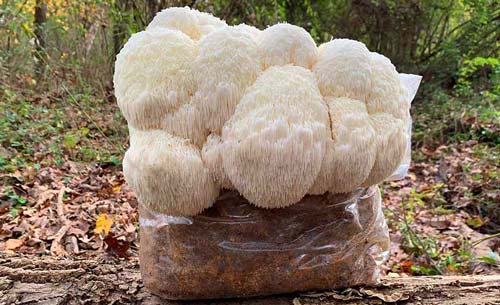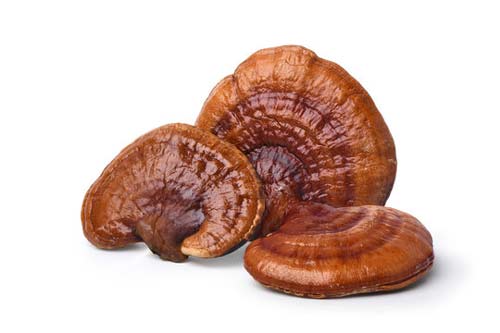Different Mushroom Types
There are countless mushroom types we could talk about, but we’re concentrating on those that are interesting and popular among home growers. In essence there are typically 3 reasons why you might want to grow mushrooms; to eat them, for their medicinal purposes and (where it’s legal) for recreational purposes. You’ll find fuller descriptions of the more popular mushroom types elsewhere on this site (check the mushroom type menu) and here we’re just looking at the benefits of mushrooms in particular.
Health Benefits of Mushrooms

Lion’s mane mushrooms
Even the most basic research will tell you that mushrooms are good for you. The list of benefits can vary between different species but the main health benefits of mushrooms are these:
- They are fat-free, naturally low in sodium, very low in calories, are cholesterol-free, packed with fiber, antioxidants, vitamin D and minerals.
- They can help protect your heart – Mushrooms are rich in the B vitamins: riboflavin, niacin, and pantothenic acid.
- They can promote lower cholesterol – shiitake mushroomscontain compounds that inhibit the production of cholesterol and block cholesterol from being absorbed
- They can decrease the risk of cancer – Mushrooms are a source of ergothioneine, an amino acid and antioxidant that slows cellular damage.
- They can stimulate a healthier gut – Research shows that mushroom polysaccharides, their most abundant carbohydrate, stimulate the growth of healthy bacteria.
- They contain potassium – There’s about as much potassium in 2/3 cup of cooked Portobello mushroom as a medium-sized banana.
- They can support a healthier immune system – your immune system will benefit from mushrooms whose nutrients include Selenium Vitamin D Vitamin B6
- Psilocybin, the psychedelic compound found in magic mushrooms, helps to “open up” depressed people’s brains, even weeks after use, a study has found.
Mushroom types for eating
The most popular mushrooms for culinary purposes are Oyster, Shiitake, Portobello, Chanterelle and Lion’s Mane mushrooms, and they are all pretty easy to grow – Oyster mushrooms are widely considered the best choice for newcomers to mushroom growing for that very reason. Lion’s Mane mushrooms are grown for both culinary and medicinal purposes.
There are other mushrooms which you might grow for for culinary purposes, such as Button and Porcini, but you can pick up Buttons in more or less any food shop which means there’s little point in investing effort growing them. Porcini, on the other hand are hard to come by and quite expensive, with reason. They are very hard to grow and nobody has yet been able to farm them commercially.

Reishi mushrooms
Mushroom Types for medicinal uses
Among those mushrooms acknowledged for their medicinal or health benefits are Reishi mushrooms, Lion’s Mane mushrooms and Turkey Tail mushrooms. Spores are widely available for growers and they’re no harder to grow than those cultivated for culinary purposes.
Recreational mushrooms – a warning
‘Magic Mushrooms’ very well-known for their hallucinogenic qualities. One of the main active components is the chemical ‘psilocybin’ and this drug has been restricted as a Class A drug in the UK since 1971. That means they are illegal to cultivate, posess and sell in the UK and many other parts of the world but it’s no secret that they are widely grown nonetheless. In the UK, their spores can be purchased legally, but only for microscopy. Although illegal, medical research and feedback from users suggests that they can have benefits when used to treat several mental health issues, including depression, OCD and relieving fear and anxiety in general through micro-dosing. Their use in mainstream medicine for treating these conditions may well become more common in future but for now they are treated legally as little different to hard drugs.
